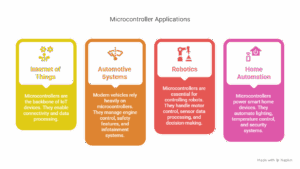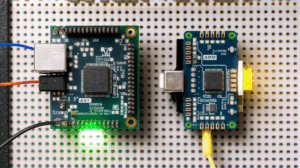
Python certification course by Elysium Embedded School: A Complete Beginner’s Guide to Learning Python Step-by-Step
June 6, 2025
IoT Training and Certification for Building Smart, Scalable Solutions
June 13, 2025Microcontrollers are the unsung heroes powering most modern electronic devices. From smartphones and wearable technology to home automation and IoT solutions, these tiny devices play a crucial role in controlling functions across industries.
Whether you’re a complete beginner or an industry professional looking to level up your skills, a Microcontroller Certification Course provides a structured learning pathway to mastering this essential technology. This blog will dive deep into what a microcontroller certification course entails, how it can benefit you, and why taking an online microcontroller certification course can accelerate your career. Along the way, we’ll explore topics like AVR and ARM microcontroller courses, Arduino microcontroller programming, and more.
Table of Contents
Understanding Microcontrollers and Their Applications
Before diving into courses and certifications, it’s important to understand what microcontrollers are and why they matter.
A microcontroller is a small, self-contained computer designed to handle specific tasks in embedded systems. Unlike a microprocessor, which often requires external memory and peripheral devices, a microcontroller has built-in memory, I/O ports, and processing capabilities. These characteristics make it ideal for controlling devices in applications ranging from automated systems to robotics.
Real-World Applications of Microcontrollers
Microcontrollers are everywhere in today’s world. Some of their most popular applications include:
- Internet of Things (IoT): Microcontrollers are essential for connecting devices in IoT ecosystems. Think of smart home devices like thermostats, lights, and security cameras that use microcontrollers to manage tasks and communicate.
- Automotive Systems: From engine management to anti-lock braking systems (ABS), microcontrollers are used in nearly every aspect of modern vehicles.
- Robotics: Microcontrollers form the brain of robotic systems, controlling movement, sensors, and actuators.
- Home Automation and Consumer Electronics: Everything from washing machines to coffee makers relies on microcontrollers to function efficiently.
Given their widespread use, gaining proficiency in microcontroller programming can significantly enhance your career prospects in these rapidly growing fields.
Microcontroller Programming for Beginners
For beginners, microcontroller programming might seem intimidating, but it is a skill that can be mastered with practice and the right guidance. Fortunately, there are plenty of resources available to help you get started.
What You Need to Know
The first step in microcontroller programming for beginners is understanding the hardware that you’ll be working with. Microcontrollers typically consist of:
- CPU (Central Processing Unit): The brain of the microcontroller that processes instructions.
- Memory (RAM, Flash): Used to store both the program and data.
- I/O Ports: These allow the microcontroller to interface with the outside world (sensors, motors, displays).
The Most Common Programming Languages
- C: One of the most popular languages for microcontroller programming due to its simplicity and efficiency.
- Assembly Language: Low-level programming, ideal for very resource-constrained applications.
- C++: While more advanced, C++ is used for larger, object-oriented projects.
For beginners, C programming is often the best choice since it strikes a balance between simplicity and power. Many microcontroller certification courses will start with this language and build on it through hands-on projects.
In most microcontroller courses online, you’ll get the chance to work on beginner-friendly projects such as blinking LEDs, reading sensor values, or controlling motors. This kind of practical experience is essential for solidifying theoretical knowledge and developing problem-solving skills.
The Value of Earning a Microcontroller Certification: Why It Matters
In today’s fast-paced tech world, gaining practical knowledge in microcontroller programming is not just a hobby – it’s a career skill. While self-study can be rewarding, a Microcontroller Certification Course offers a structured, comprehensive approach that can significantly boost your learning and career prospects. Here’s why taking a certified microcontroller programming course can be a game-changer.
Industry-Recognized Validation of Skills
One of the primary benefits of earning a microcontroller certification course is the industry recognition it brings. Employers look for candidates who have a proven understanding of embedded systems and microcontroller programming. A certification serves as a formal recognition of your skills, making you stand out in a competitive job market. It signals to hiring managers that you have met a high standard and can contribute effectively to projects from day one.
- Why It Matters: In a field like embedded systems development, where precision and expertise are paramount, having a certification demonstrates that you possess the critical skills required for the job. It’s your ticket to building credibility in the industry.
A Structured Learning Experience
Learning microcontroller programming through trial and error is useful, but it can be inefficient and overwhelming. A microcontroller certification course offers a well-defined syllabus, guiding you through the essential topics, concepts, and techniques. This structured approach ensures that you don’t miss any crucial elements, such as memory management, hardware interfacing, or real-time system design.
- Why It Matters: Having a clear roadmap means you won’t waste time learning things that aren’t as important or skipping over key concepts. With a structured course, you’re sure to develop a comprehensive understanding of both theory and practice.
Career Advancement and Opportunities
The most obvious benefit of earning a microcontroller certification course is its potential to boost your career. A formal qualification in microcontroller programming opens up opportunities in industries such as IoT, automotive electronics, robotics, and consumer electronics. Employers are more likely to choose candidates who can demonstrate a strong foundation in the field, and a certification provides you with the competitive edge you need to secure a job in a specialized and growing industry.
- Why It Matters: Whether you’re aiming for a role as an embedded systems engineer, IoT developer, or firmware engineer, a certification signals to employers that you’re serious about your career and have the skills to excel in challenging roles. It can also increase your earning potential, as certified professionals are often paid more than those without formal qualifications.
AVR and ARM Microcontrollers: A Detailed Comparison
1. AVR Microcontrollers: Ideal for Beginners and Entry-Level Projects
AVR microcontrollers are widely recognized as an excellent starting point for anyone new to embedded systems and microcontroller programming. These microcontrollers are commonly used in development boards like Arduino, making them a popular choice for beginners.
- Why Choose AVR for Beginners?
AVR is straightforward to work with and comes with a vast array of tutorials, community forums, and resources. With its simple setup, low-cost boards, and accessibility to developers, it’s an ideal platform for experimenting with basic projects like blinking LEDs, reading sensors, or controlling motors. If you’re taking a microcontroller programming course online, AVR will be featured heavily, offering hands-on experience to build your skills and understanding. - Pros of AVR
- Simple architecture, perfect for beginners
- Extensive community and resources
- Low-cost, versatile development boards (Arduino, etc.)
- Great for hands-on experiments and rapid prototyping
2. ARM Microcontrollers: Power and Performance for Advanced Projects
ARM-based microcontrollers, on the other hand, are designed for more advanced applications. These microcontrollers are often used in high-performance embedded systems found in smartphones, wearable devices, automotive systems, and industrial automation.
- Why Choose ARM for Advanced Projects?
ARM microcontrollers come with significantly more processing power, speed, and advanced features compared to AVR. As a result, they are widely used in professional, high-performance embedded systems. If you’re looking to work with real-time operating systems (RTOS), multi-core systems, or complex computing tasks, an ARM microcontroller course will offer the tools and knowledge necessary for success in these fields. - Pros of ARM
- Higher processing power and performance
- Advanced features (RTOS, multitasking, high-speed peripherals)
- Used in industry-standard applications (mobile, IoT, automotive)
- Rich ecosystem of development tools and libraries
The Advantages of Learning Microcontroller Programming Online
Taking a microcontroller course online comes with numerous advantages, particularly in terms of flexibility and learning pace.
Flexibility and Accessibility
The primary advantage of online courses is flexibility. You can take the course from anywhere in the world, at any time that fits your schedule. Whether you’re working full-time, a student, or simply have a busy lifestyle, online microcontroller certification course allow you to learn at your own pace.
Interactive Learning Materials
Many online courses use a combination of video lectures, quizzes, and interactive assignments to reinforce concepts. For example, you’ll often be guided through building real projects using Arduino microcontroller programming, with detailed explanations of each step. Some courses even use virtual labs to help you simulate microcontroller systems if you don’t have access to hardware.
Arduino: The First Step in Your Microcontroller Programming.
Arduino has become a go-to platform for microcontroller programming, especially for beginners. The ease of use, combined with a vast community and ecosystem, makes it a perfect choice for anyone starting their microcontroller programming journey.
What Makes Arduino Stand Out?
- Simple IDE: The Arduino Integrated Development Environment (IDE) is easy to install and use. The code is written in a simplified version of C++, making it easier to learn.
- Large Community Support: The Arduino ecosystem is massive, with countless tutorials, forums, and resources available. If you ever get stuck, the chances are someone has already solved the issue.
- Wide Range of Projects: Whether you’re building a simple sensor-based system or a complex robot, Arduino microcontroller programming allows you to experiment with a variety of components.
Arduino for Beginners
In most beginner-level microcontroller programming courses, you’ll start by learning to program Arduino. Projects like blinking an LED, controlling a motor, or reading sensor data are common first steps. Once you’re comfortable with Arduino, you can easily transition to more advanced projects using AVR or ARM microcontrollers.
Microcontroller Certification Course: Why It’s Essential for Your Career Growth
In today’s fast-paced tech world, gaining practical knowledge in microcontroller programming is not just a hobby – it’s a career skill. While self-study can be rewarding, a Microcontroller Certification Course offers a structured, comprehensive approach that can significantly boost your learning and career prospects. Here’s why taking a microcontroller certification course can be a game-changer.
Industry-Recognized Validation of Skills
One of the primary benefits of earning a microcontroller certification course is the industry recognition it brings. Employers look for candidates who have a proven understanding of embedded systems and microcontroller programming. A certification serves as a formal recognition of your skills, making you stand out in a competitive job market. It signals to hiring managers that you have met a high standard and can contribute effectively to projects from day one.
- Why It Matters: In a field like embedded systems development, where precision and expertise are paramount, having a certification demonstrates that you possess the critical skills required for the job. It’s your ticket to building credibility in the industry.
A Structured Learning Experience
Learning microcontroller programming through trial and error is useful, but it can be inefficient and overwhelming. A microcontroller certification course offers a well-defined syllabus, guiding you through the essential topics, concepts, and techniques. This structured approach ensures that you don’t miss any crucial elements, such as memory management, hardware interfacing, or real-time system design.
Having a clear roadmap means you won’t waste time learning things that aren’t as important or skipping over key concepts. With a structured course, you’re sure to develop a comprehensive understanding of both theory and practice.
Career Advancement and Opportunities
The most obvious benefit of earning a microcontroller certification course is its potential to boost your career. A formal qualification in microcontroller programming opens up opportunities in industries such as IoT, automotive electronics, robotics, and consumer electronics. Employers are more likely to choose candidates who can demonstrate a strong foundation in the field, and a certification provides you with the competitive edge you need to secure a job in a specialized and growing industry.
- Why It Matters: Whether you’re aiming for a role as an embedded systems engineer, IoT developer, or firmware engineer, a certification signals to employers that you’re serious about your career and have the skills to excel in challenging roles. It can also increase your earning potential, as certified professionals are often paid more than those without formal qualifications.
Career Opportunities After a Microcontroller Certification Course
After completing a microcontroller certification course, you’ll be well-positioned to enter the embedded systems job market. Here are a few roles you might pursue:
- Embedded Systems Engineer: Work on designing and developing embedded systems that use microcontrollers in everything from automotive to consumer electronics.
- IoT Developer: With microcontroller programming skills, you can develop IoT devices that connect and communicate with other systems.
- Firmware Engineer: Focus on writing low-level software for microcontroller systems, including everything from device drivers to communication protocols.
- Robotics Engineer: Microcontrollers are central to robotic systems, and you’ll be well-versed in programming them to control motors, sensors, and logic.
By mastering AVR, ARM, or Arduino microcontroller programming, you’ll be ready for these roles and more, positioning yourself for a rewarding career in one of the most exciting fields in tech today.
Frequently Asked Questions (FAQs)
- What is the duration of a typical microcontroller certification course at Elysium Embedded School?
The duration of a microcontroller certification course at Elysium Embedded School typically ranges from 6 to 12 weeks, depending on whether you opt for a full-time or part-time learning path. You can also choose a self-paced learning option to fit the course around your schedule. - Do I need prior programming experience to join a microcontroller programming course for beginners at Elysium Embedded School?
No, at Elysium Embedded School, most of their microcontroller programming courses for beginners are designed for students with little or no prior programming experience. The courses are structured to guide you through the basics step-by-step, ensuring a solid foundation in microcontroller programming. - Which microcontroller should I start with: AVR, ARM, or Arduino?
For beginners, Arduino microcontroller programming is often the best choice, and Elysium Embedded School recommends starting with Arduino due to its simplicity, user-friendly interface, and large community. Once you’re comfortable, you can explore AVR and ARM microcontrollers for more advanced embedded systems development. - Can I get a job after completing an online microcontroller certification course from Elysium Embedded School?
Absolutely! With a microcontroller certification course from Elysium Embedded School and hands-on experience from the courses, you will be well-prepared for various roles, including embedded systems engineer, IoT developer, firmware engineer, and other career opportunities in the embedded systems - How practical are the projects in Elysium Embedded School online microcontroller certification courses?
Elysium Embedded School places a strong emphasis on practical, real-world projects in their microcontroller courses. You’ll work on projects that involve building and programming actual embedded systems using popular microcontrollers like Arduino, AVR, and ARM. These hands-on experiences will allow you to apply the concepts you learn and develop industry-ready skills.
Conclusion
The field of microcontroller programming offers vast opportunities, from home automation and IoT devices to robotics and embedded systems development. A microcontroller certification course provides the structured learning, hands-on experience, and industry recognition needed to thrive in this field. Whether you’re starting with Arduino microcontroller programming, exploring AVR and ARM microcontroller courses, or aiming to enhance your career with a microcontroller certification course, there’s never been a better time to get involved.
A Microcontroller Certification Course not only builds strong technical foundations but also enhances your credibility in the job market. With in-depth training on real-time embedded systems, programming logic, and circuit interfacing, certified learners gain a competitive edge. These programs often include project-based modules, expert mentorship, and placement assistance—making them ideal for both freshers and professionals seeking specialization in embedded technology.
If you’re ready to take the next step, explore high-quality microcontroller certification course online at platforms like Embedded School and begin your journey to becoming an expert in microcontroller programming today!













